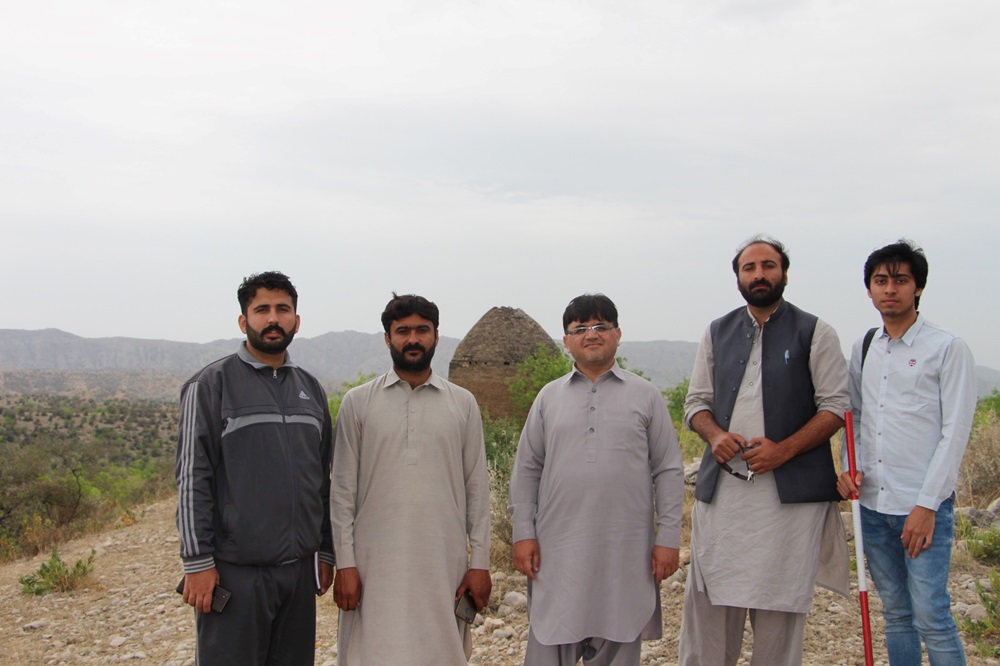Written by: Sirat Gohar Daudpoto
Posted on: February 14, 2024 |  | 中文
| 中文
Dr. Sadeed Arif excavating at Jannan Wali Dheri Buddhist Site in Taxila Valley (Photograph by Dr. Sadeed Arif)
The people, who are doing archaeology, at some point in their archaeological journey must ask at least one question in all seriousness that why archaeology is important, because one cannot contribute to archaeology unless one realizes its importance. This has to do with an individual’s seriousness and interest in his/her field.
Being an archaeologist, I asked this question from myself and my teachers several times. My interest in archaeology and attitude towards it and my understanding of the subject is shaped by the responses to this question. One of my teachers, Doctor Sadeed Arif, whenever he discusses archaeology, talks about its importance and each time gives a different explanation. I dedicate this write-up to Dr. Sadeed Arif for his monumental contribution as a field archaeologist and a Professor of Archaeology. It contains Dr. Sadeed’s short biography and contribution to the field, and lastly his views on the future of archaeology in Pakistan.

Dr. Sadeed Arif (center) in Mianwali during an archaeological survey (Photograph by Dr. Sadeed Arif)
Dr. Sadeed Arif is a Pakistani archaeologist. He was born on 27 June 1977 in the Jangal Khel village in District Kohat of the North West Frontier Province (NWFP) (present-day Khyber Pakhtunkhwa province) of Pakistan. After getting his early education in his village, he went to Kohat and did his bachelor’s at the Government Post-Graduate College, Kohat. Dr. Sadeed Arif studied archaeology at the Department of Archaeology, University of Peshawar, where he completed his MA (Archaeology) in 2000 and PhD (Buddhist Archaeology) in 2014. Furthermore, he was trained in field archaeology under the supervision of the eminent Pakistani archaeologists like Ahmed Hassan Dani, Abdur Rehman and Muhammad Farooq Swati.
Dr. Sadeed is an Assistant Professor of Archaeology at the Taxila Institute of Asian Civilizations (TIAC), Quaid-i-Azam University, Islamabad. In this Institute, his first appointment was as a Research Fellow in 2006, and later on in 2009, he became a Lecturer/Fieldwork Supervisor. Since 2015, he has been working as an Assistant Professor at this Institute. He teaches different courses to the students of BS, MPhil and PhD (e.g., Introduction to Archaeology, Field Archaeology, Numismatics, Paleography and Epigraphy, Islamic Art and Architecture, Archaeology of South Asia, Gandhara Civilization, Kharoshti Script, Museology). As an Assistant Professor, he has supervised many PhD, MPhil, MSc and BS students, and several are currently doing their research under his guidance.
As a field archaeologist, Dr. Sadeed has conducted archaeological surveys and excavations in different regions of Pakistan, and he has also conducted/received trainings in museology, archaeology and cultural heritage. The list of his fieldwork and related activities is as follows:
1. Excavations conducted at Gor-Khuttree, Peshawar, under the Directorate of Archaeology and Museums in 2004;
2. Archaeological survey and exploration in Kohat and Hangu, under the Directorate of Archaeology and Museums, Government of Khyber Pakhtunkhwa in 2005;
3. Archaeological survey of Chakwal under TIAC, Quaid-i-Azam University, Islamabad in 2006;
4. Archaeological survey of Rawalpindi and Islamabad under TIAC, Quaid-i-Azam University, Islamabad in 2009 (Phase I);
5. Archaeological survey of Rawalpindi and Islamabad under TIAC, Quaid-i-Azam University, Islamabad in 2010 (Phase II);
6. Excavation at Badalpur Buddhist Monastery under TIAC, Quaid-i-Azam University, Islamabad from 2011 to date;
7. Survey and excavation in Kashmir, funded by HEC under Thematic Research Grant, 2014, 2015;
8. Excavation at Badalpur Taxila Valley funded by NFCH;
9. Co-Principal Investigator in the “Survey and Documentation of Archaeological Sites and Monuments in Malakand, Khyber Pakhtunkhwa”, funded by HEC since July 2016;
10. Excavation at Jinnan Wali Dheri, Taxila Valley, funded by the National Fund For Cultural Heritage (NFCH), 2017;
11. Special training at Simithsonian Institution Washington D.C and Wisconsin University, USA titled “Cultural Heritage and Museum, 2014.
Dr. Sadeed has written around 30 research papers that include articles, book reviews and archaeological survey and excavation reports in peer-reviewed national and international research journals. He has also presented his research at several national and international conferences, and delivered lectures at reputable institutions. His main area of specialization is the Buddhist archaeology of Gandhara, and archaeological survey and excavation is his forte.
As a field archaeologist and Assistant Professor of Archaeology, Dr. Sadeed is optimistic about the future of archaeology in Pakistan, in both academic institutions and administrative archaeological bodies. He suggested that new museums should be built in the country to showcase the archeological rich material housed in Taxila, Peshawar and other museums of Pakistan. He has suggested that there are several vacant archaeological positions in the archaeology departments of Sindh and Punjab provinces, and believes that the appointments of archaeologists will strengthen these departments. Furthermore, in an interview with the author he said that with CPEC, the tourism sector of Pakistan will get a boost, and many Chinese students interested in its Buddhist heritage have started coming to Pakistan for studies, and similarly a number of Pakistani students are going to China for it. Dr. Sadeed said that the future of archaeology in Pakistan is bright, and there is an urgent need to develop new archaeological and heritage-related-institutions.
You may also like: